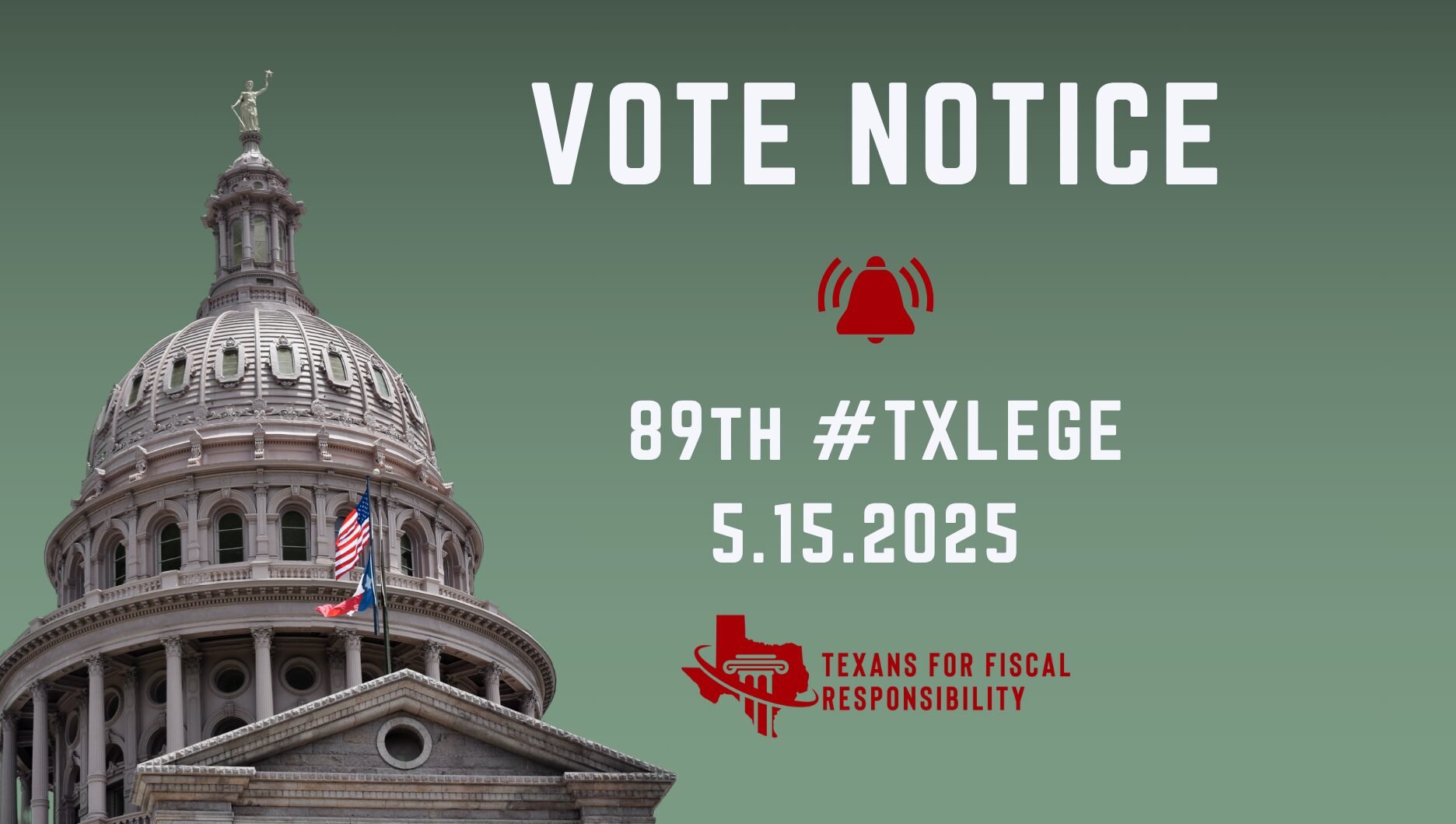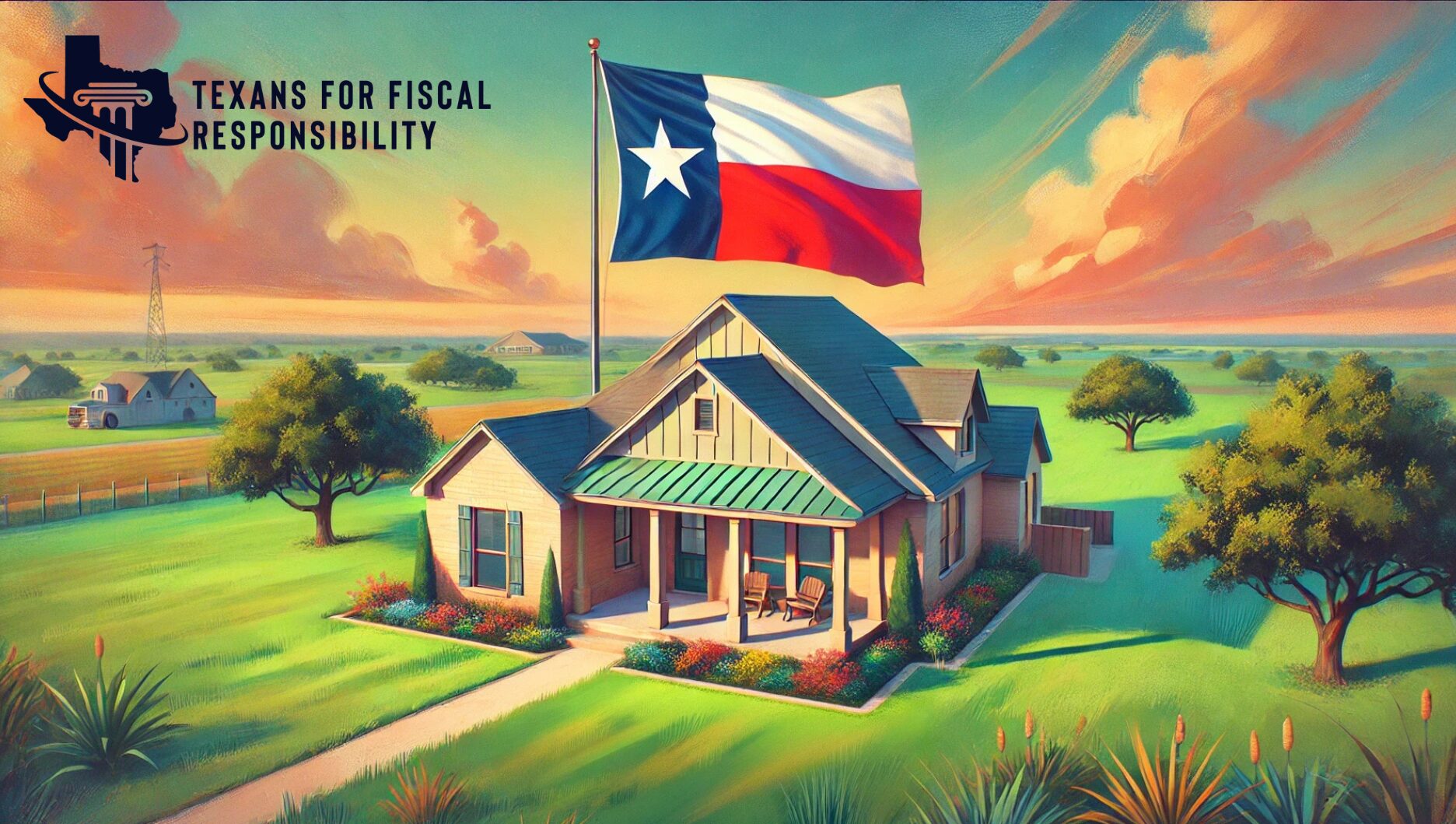
Texans for Fiscal Responsibility has issued the following vote notice for May 15th, 2025
Texas House of Representatives
Subject: House Bill 4847 (HB 4847) – School recapture transparency
- Author: State Rep. Todd Hunter (R-Corpus Christi)
- Caption: Relating to the dissemination of certain school district ad valorem tax-related information.
- TFR Position: SUPPORT
- Background:
- HB 4847 promotes greater transparency in Texas’ school finance system by shedding light on how much of a school district’s property tax revenue is taken by the state through the “Robin Hood” recapture program. The bill requires appraisal districts to post, in their online property tax databases, the percentage of local taxes that districts must send to the state and the percentage they keep. This gives taxpayers a clearer picture of where their money goes and how it’s used to fund education across the state. The added clarity could fuel future reform of a deeply unpopular system that redistributes local funds with limited oversight. Ultimately, this bill informs voters without growing bureaucracy or spending new money.
Subject: House Bill 1449 (HB 1449) – Streamlines mobile food permitting
- Author: State Rep. Giovanni Capriglione (R-Southlake)
- Caption: Relating to permits for mobile food service establishments operating in certain counties.
- TFR Position: SUPPORT
- Background:
- HB 1449 streamlines regulations for mobile food vendors by allowing a single county-level permit to suffice for operating in multiple cities within large counties. This reduces unnecessary bureaucracy, saves small business owners time and money, and encourages entrepreneurship, especially in high-cost urban areas. The bill blocks cities from layering on redundant permits, cutting down on overregulation and eliminating a hidden tax on doing business. It also ensures that any fees charged for these permits are limited to actual administrative costs, preventing local governments from using permits as revenue sources. Overall, this bill supports free enterprise and trims government red tape.
Subject: House Bill 158 (HB 158) – Government housing study
- Author: State Rep. Richard Raymond (D-Laredo)
- Caption: Relating to a study on the use of surplus government property to provide housing to veterans and low-income families.
- TFR Position: OPPOSE
- Background:
- HB 158 mandates a state agency to study whether unused government land or buildings can be converted into housing for veterans and low-income families. While well-intentioned, the bill sets the stage for expanded government intervention in housing markets and paves the way for future taxpayer-funded programs or subsidies. The study will explore various public and private funding streams, potentially positioning the state to engage in or support housing development—something that should be a private-sector domain. This bill also opens the door for long-term obligations and mission creep beyond its initial scope. Although the study itself has a sunset date, the bureaucratic resources and focus it consumes reflect a misalignment of priorities. Instead of exploring new roles for government, efforts should be aimed at reducing regulation and encouraging private development.
Subject: House Bill 1955 (HB 1955) – New Grant Program
- Author: State Rep. Senfronia Thompson (D-Houston)
- Caption: Relating to the establishment of an early childhood mental health home visiting grant program.
- TFR Position: OPPOSE
- Background:
- HB 1955 sets up a new state-run grant program to fund mental health home visits for families with young children who are considered at high risk. These visits must follow federal guidelines and involve mental health professionals paired with care coordinators. While the bill is well intentioned, it expands state government by creating an entirely new grant structure, overseen and regulated by HHSC. It gives broad discretion to the agency to adopt rules and standards, increasing administrative overhead. The bill also opens the door to future funding obligations through ongoing contracts and long-term program support. From a fiscally conservative view, the bill duplicates existing community services, adds new bureaucracy, and lacks clear limits on long-term costs or measurable outcomes.
Subject: House Bill 2512 (HB 2512) – Limits ETJ release
- Author: State Rep. Charlie Geren (R-Fort Worth)
- Caption: Relating to the release of certain areas from a municipality’s extraterritorial jurisdiction by petition or election.
- TFR Position: OPPOSE
- Background:
- HB 2512 backtracks on recent reforms that gave landowners more freedom to exit a city’s extraterritorial jurisdiction (ETJ). It creates new carve-outs that block smaller properties and certain subdivisions from leaving city oversight, regardless of owner consent. These changes restrict property rights by preventing landowners from opting out of municipal control, even in areas outside city limits. Instead of allowing local consent and limited government, it entrenches municipal authority over private landowners. The bill reinstates bureaucratic barriers, especially favoring large urban municipalities with over 900,000 residents. From a fiscal conservative view, this expands government reach without voter input. Overall, it undermines self-determination and props up city control at the expense of limited government principles.
Subject: House Bill 2581 (HB 2581) – Improves oversight of taxpayer dollars
- Author: State Rep. Lacey Hull (R-Houston)
- Caption: Relating to the information required for payment of services provided through the Thriving Texas Families Program.
- TFR Position: SUPPORT
- Background:
- HB 2581 enhances accountability in the Thriving Texas Families Program by requiring itemized documentation before taxpayer money is used to reimburse service providers. By mandating a standardized form with anonymized client tracking, specific service details, and confirmation that resources were shared, the bill strengthens oversight and prevents wasteful spending. It ensures public funds are tied to verifiable, outcome-focused support for mothers and families. This structured reporting helps identify gaps in service delivery, allowing better allocation of limited resources. The bill safeguards against abuse while keeping the focus on delivering measurable results. Overall, it promotes responsible stewardship of taxpayer dollars while supporting Texas families.
Subject: House Bill 2803 (HB 2803) – Election transparency
- Author: State Rep. Richard Hayes (R-Hickory Creek)
- Caption: Relating to requiring an election judge to provide a watcher removed from a polling place a signed statement containing the reason for the removal.
- TFR Position: SUPPORT
- Background:
- HB 2803 increases transparency and accountability in Texas elections by requiring a written explanation when a poll watcher is removed after being accepted to serve. This ensures election judges are held responsible for their decisions and deters arbitrary or politically motivated removals. The bill promotes oversight without expanding bureaucracy or creating costly new enforcement mechanisms. It strengthens existing election safeguards without imposing additional taxpayer burden. This change supports citizen involvement and confidence in the electoral process while maintaining limited government interference. It is a straightforward step to improve transparency while respecting taxpayers and voters alike.
Subject: House Bill 627 (HB 627) – Fast-tracks subsidized housing
- Author: State Rep. Philip Cortez (D-San Antonio)
- Caption: Relating to the requirements for applications for low income housing tax credits for certain developments financed through the private activity bond program.
- TFR Position: OPPOSE
- Background:
- HB 627 weakens local authority over low-income housing developments by allowing state approval if large local governments fail to act within 90 days. While this may address bureaucratic delays, it undermines local control and bypasses the objections of residents and taxpayers. The bill could fast-track developments that may impose infrastructure costs or impact neighborhoods without sufficient local input. Rather than eliminating red tape, this bill removes an important safeguard of taxpayer-funded incentives. By narrowing which jurisdictions must approve these projects and letting silence equal consent, HB 627 shifts power away from local elected bodies. Ultimately, HB 627 risks subsidizing developments without proper scrutiny or local consent.
Subject: House Bill 636 (HB 636) – Homelessness database
- Author: State Rep. Armando Walle (D-Houston)
- Caption: Relating to the implementation of a statewide homeless data sharing network to share real-time data on homelessness.
- TFR Position: OPPOSE
- Background:
- HB 636 requires a state agency to build and manage a centralized data network tracking homelessness across Texas. It partners government operations with nonprofits and private healthcare groups, all funded by taxpayer dollars. The program adds permanent staffing to the state payroll and contracts for ongoing cybersecurity expenses, costing nearly half a million dollars in its first two years. This bill grows bureaucracy and spending without addressing root causes of homelessness or offering clear accountability.
Subject: House Bill 3679 (HB 3679) – Disaster response transportation reform
- Author: State Rep. Carl Tepper (R-Lubbock)
- Caption: Relating to the operation of certain vehicles during disasters.
- TFR Position: SUPPORT
- Background:
- HB 3679 allows dyed diesel fuel, which is normally restricted to farm and construction vehicles, to be temporarily used in on-road vehicles during officially declared disasters. This ensures that critical agricultural operations and emergency supply chains aren’t disrupted when standard diesel is unavailable. The bill also authorizes special overweight vehicle permits to transport agricultural goods in disaster areas, reducing the number of trips and fuel costs for producers. These permits are tightly controlled—limited by time, geography, and subject to DPS oversight—to prevent misuse. This measure supports emergency responsiveness without creating ongoing exemptions or government expansion. It prioritizes efficiency, minimizes bureaucratic red tape, and ensures taxpayer-supported systems remain responsive and adaptable in times of crisis.
Subject: House Bill 4099 (HB 4099) – Expands physical therapy access
- Author: State Rep. Caroline Harris (R-Round Rock)
- Caption: Relating to the treatment of a patient by a physical therapist without a referral.
- TFR Position: SUPPORT
- Background:
- HB 4099 expands patient access to physical therapy by removing bureaucratic hurdles that delay care. By allowing qualified physical therapists to treat patients for up to 30 days without needing a referral, HB 4099 helps reduce unnecessary doctor visits, lowers healthcare costs, and frees up physicians to focus on more critical needs. It also aligns Texas with the majority of other states that already allow longer direct access. This reform supports preventative care, enabling faster recovery and minimizing more expensive interventions down the line. It imposes no new cost to taxpayers and relies on already-licensed professionals meeting existing standards.
Subject: House Bill 3178 (HB 3178) – HOT tax expansion
- Author: State Rep. Wes Virdell (R-Brady)
- Caption: Relating to the authority of certain counties to impose a hotel occupancy tax.
- TFR Position: OPPOSE
- Background:
- HB 3178 allows Kerr County to impose a new hotel occupancy tax on visitors staying in unincorporated areas. While pitched as a tourism boost, this bill introduces a new layer of taxation that expands local government revenue without addressing spending discipline. Rather than reducing reliance on taxpayer funding or cutting waste, it seeks to grow government through taxation. The bill creates a carveout targeting a specific county, setting a precedent for more localized tax authority across Texas. This can lead to tax creep, where various jurisdictions keep adding small taxes that collectively burden consumers. It also circumvents the broader debate over comprehensive tax reform by authorizing narrow taxes to fund specific facilities.
Subject: House Bill 3182 (HB 3182) – HOT tax subsidy
- Author: State Rep. Helen Kerwin (R-Glen Rose)
- Caption: Relating to the authority of certain municipalities to use certain tax revenue derived from a hotel and convention center project.
- TFR Position: OPPOSE
- Background:
- HB 3182 is a carveout bill that allows the City of Burleson to siphon off future state hotel and sales tax revenues for a decade to fund a convention center project. Rather than letting tax dollars flow into the general fund for statewide priorities or tax relief, the bill enables local government to divert state revenue for local economic development efforts. The bill sets a precedent for other cities to seek similar special treatment, accelerating the growth of tax incentive loopholes that weaken the state’s long-term revenue stability. With state taxpayers on the hook for over $5 million in projected losses over ten years, this represents a form of corporate welfare. These types of projects should rise or fall on their own merits.
Subject: House Bill 2132 (HB 2132) – Low-income housing credits
- Author: State Rep. Salman Bhojani (D-Euless)
- Caption: Relating to the allocation of low income housing tax credits to projects reserved for elderly persons.
- TFR Position: OPPOSE
- Background:
- HB 2132 changes the rules for how Texas awards low-income housing tax credits by giving preferential treatment to projects designed for elderly residents. It removes previous limits that prevented too many senior-only developments from being concentrated in large urban counties. The bill also lets the state housing agency award more points to elderly housing projects than to general population projects, even if both meet the same requirements. This bill distorts market competition by injecting favoritism into what should be an impartial scoring process. It risks diverting taxpayer-backed incentives away from the most efficient or high-need projects. Rather than reforming the overall process for fairness and efficiency, it carves out another exception that opens the door for special-interest influence. From a fiscally conservative perspective, this is another case of government picking winners and losers at the expense of taxpayers.
Subject: House Bill 3241 (HB 3241) – HOT tax subsidy
- Author: State Rep. Caroline Harris (R-Round Rock)
- Caption: Relating to the authority of certain municipalities to use certain tax revenue for hotel and convention center projects.
- TFR Position: OPPOSE
- Background:
- HB 3241 grants the City of Georgetown special access to divert state hotel and sales tax revenues from a future hotel-convention center project back into its own coffers. Instead of allowing these revenues to support broader state services or tax relief, the bill funnels public money into a single local development. This represents a classic case of corporate subsidy masked as economic development, shifting taxpayer risk to fund private ventures with uncertain returns. The bill sets a bad precedent by expanding a list of hand-picked cities eligible for these tax carveouts, which weakens the integrity of state budgeting and fuels local lobbying for preferential treatment. From a limited government standpoint, the bill fuels government-led investment schemes instead of encouraging organic growth and private capital formation.
Subject: House Bill 3169 (HB 3169) – HOT tax subsidy
- Author: State Rep. Benjamin Bumgarner (R-Flower Mound)
- Caption: Relating to the authority of certain municipalities to use certain tax revenue derived from a hotel and convention center project.
- TFR Position: OPPOSE
- Background:
- HB 3169 gives the City of Carrollton a special deal to divert state hotel and sales tax revenue for a hotel and convention center project. While framed as economic development, the bill effectively subsidizes private ventures with public funds and sets a precedent for other cities to seek similar carveouts. This opens the floodgates for expanding government-backed tax diversions without sufficient oversight or measurable returns. The state forfeits nearly $700,000 per year—money that could otherwise reduce the tax burden or support core state services. Rather than encouraging self-sufficient growth, the bill expands government’s role in picking winners and losers in the marketplace.
Subject: House Bill 3441 (HB 3441) – Liability for harmful vaccine ads
- Author: State Rep. Shelley Luther (R-Tom Bean)
- Caption: Relating to the liability of vaccine manufacturers that advertise a harmful vaccine.
- TFR Position: SUPPORT
- Background:
- HB 3441 holds vaccine manufacturers financially accountable if they advertise their product in Texas and that product causes harm. The bill reinforces the principle that private companies should bear responsibility for the real-world consequences of their marketing. This legislation protects Texas taxpayers from footing the bill for injuries caused by powerful corporations shielded under federal law. It strengthens individual legal recourse without growing state bureaucracy or creating new regulations. The bill promotes transparency and consumer protection in a way that aligns with limited government values—relying on the courts, not agencies, to resolve disputes. In effect, it discourages reckless pharmaceutical promotion while respecting free market boundaries. This is a reasonable, narrowly tailored approach to corporate accountability that doesn’t expand government power or spending.
Subject: House Bill 5596 (HB 5596) – Prevents HOT tax abuse
- Author: State Rep. Terri Leo-Wilson (R-Galveston)
- Caption: Relating to the calculation of the voter-approval tax rate for certain municipalities that receive municipal hotel occupancy tax revenue and other money from a local park board of trustees.
- TFR Position: SUPPORT
- Background:
- HB 5596 aims to stop coastal cities from misusing hotel occupancy tax (HOT) funds that are meant to support tourism, events, and visitor amenities. Some cities have been spending this money on general government operations instead of tourism-related purposes, bypassing their park boards. SB 2532 fixes this by penalizing cities that divert HOT funds — lowering the property tax rate they can adopt without a public vote. It calculates a “misspent money rate” and subtracts it from the voter-approval tax rate, meaning cities that misuse funds lose taxing flexibility. This ties HOT fund accountability directly to property tax authority. From a fiscally conservative view, the bill promotes transparency and protects tax dollars from misuse.
Subject: House Bill 3335 (HB 3335) – Property giveaway to non-profits
- Author: State Rep. Sheryl Cole (D-Austin)
- Caption: Relating to the authority of a county to dispose of surplus and salvage property to a civic or charitable organization.
- TFR Position: OPPOSE
- Background:
- HB 3335 makes it easier for county governments to give away surplus property to local nonprofits by removing the requirement that they first attempt to sell it through a competitive bid or auction. While framed as promoting efficiency, the bill undermines transparency and opens the door to favoritism or mismanagement by allowing donations without demonstrating that a sale would be ineffective. Even though the bill requires the donation to serve a public purpose and be accompanied by some form of consideration, the value of donated property may far exceed the costs saved by the county. From a fiscally conservative perspective, this bill expands local government discretion at the expense of accountability. Instead of protecting taxpayers, it prioritizes convenience and vague notions of public benefit. Counties should first exhaust avenues to recoup value for properties before resorting to giveaways.
Texas Senate
Subject: House Bill 12 (HB 12) – Sunset review transparency and reform
- Author: State Rep. Keith Bell (R-Forney)
- Caption: Relating to the review and audit of certain state agency operations.
- TFR Position: SUPPORT
- Background:
- HB 12 improves how Texas evaluates and oversees its state agencies. It enhances the Sunset review process by requiring agencies to notify the public and license holders about reviews and invite their input. Regulatory agencies will be subject to additional, targeted reviews of their rulemaking every six years to ensure transparency and efficiency. The bill also mandates audits to evaluate how effectively agencies are spending taxpayer dollars, identifying waste and recommending improvements. This bill is a step toward smaller, more efficient government, and increases transparency and accountability.
Subject: House Bill 210 (HB 210) – Prohibits vendor-conflict school deals
- Author: State Rep. Ryan Guillen (R-Rio Grande City)
- Caption: Relating to contracting with a school district or open-enrollment charter school by a vendor with whom a member of the board of trustees or governing body of the district or school or a related individual has certain business interests; creating a criminal offense.
- TFR Position: SUPPORT
- Background:
- HB 210 cracks down on unethical contracting practices in Texas public schools and charter schools by preventing vendors from doing business with districts if a board member or their close relatives have financial ties to the vendor. It also bans deals where school officials receive valuable gifts or services from vendors. By creating criminal penalties for violations, the bill discourages insider deals and protects taxpayer funds from being funneled into sweetheart arrangements. The legislation increases punishment for repeat offenders and makes it a felony when bribes or payoffs are involved. From a fiscally conservative viewpoint, this bill promotes transparency, deters corruption, and ensures that school contracts are awarded based on merit—not political connections or personal enrichment.
Subject: House Bill 2742 (HB 2742) – Fairer tax bill payment deadlines
- Author: State Rep. Cody Vasut (R-Angleton)
- Caption: Relating to the split-payment of ad valorem taxes.
- TFR Position: SUPPORT
- Background:
- HB 2742 provides relief to property owners by extending the deadline to make partial tax payments when tax bills are mailed late. Under current law, taxpayers must pay half their taxes by December 1, even if they receive the bill just days or hours before that deadline. This bill corrects that unfair scenario by adjusting the due date based on when the bill is actually sent. It ensures that taxpayers are not penalized due to government delays and mailing inefficiencies. The measure does not mandate new spending or create bureaucratic growth—it simply applies fairness within the existing tax collection framework. It also maintains taxpayer rights to protest appraisals and appeals under the new timeline. This promotes transparency and predictability for both taxpayers and local governments. HB 2742 is a commonsense improvement that supports fiscal responsibility without expanding government.
Subject: Senate Bill 2994 (SB 2994) – Government-directed energy savings
- Author: State Sen. Nathan Johnson (D-Dallas)
- Caption: Relating to energy efficiency goals and programs, public information regarding energy efficiency programs, and the participation of loads in certain energy markets.
- TFR Position: OPPOSE
- Background:
- SB 2994 raises state-imposed energy efficiency targets for electric utilities and requires them to meet escalating savings goals over time, regardless of market demand or cost-effectiveness. A portion of each utility’s budget—at least 15%—must be set aside for low-income energy efficiency programs, even if those programs do not meet normal cost-benefit standards. The bill allows the state to increase requirements further and directs the Public Utility Commission to reassess the goals in future years. It limits utility flexibility by disqualifying load-shifting programs from counting toward compliance, meaning utilities must spend more to achieve compliance through other measures. Ratepayers ultimately bear the cost of these programs through higher utility spending. This approach prioritizes state-direction over voluntary market solutions and risks inflating energy costs under the guise of conservation. The bill expands the scope of government influence over how utilities must operate and spend.
Reminder: Vote Notices are provided to both Texas state lawmakers and the general public, sharing Texans for Fiscal Responsibility’s position on issues eligible to be rated as a part of the Fiscal Responsibility Index. Notices are provided prior to votes being taken in each legislative chamber.
Disclaimer: We reserve the right to consider amendments to legislation that may be introduced without notice as a part of issues to be rated on the Fiscal Responsibility Index. We will make every effort to provide notice on amendments that are pre-filed.




